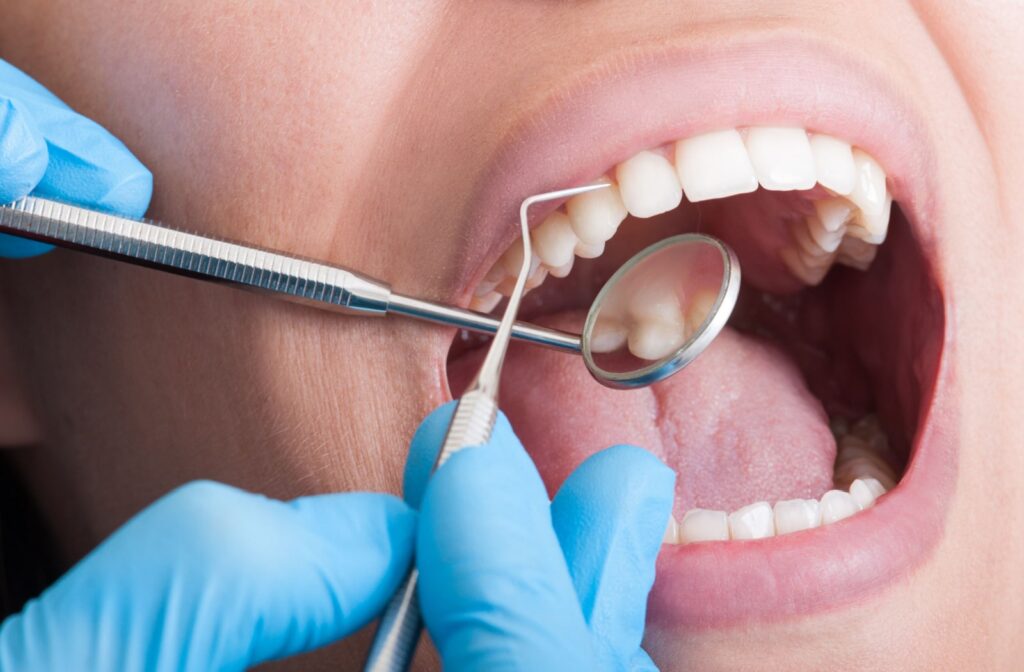How Long Does a Teeth Cleaning Take?
A visit to the dentist typically conjures up images of well-lit rooms and fresh smiles. Among the various treatments you might get during your visit, teeth cleanings are one of the most common. And with how busy life can be, it helps to know how long you will spend on this common procedure.
A teeth cleaning can take between 30–60 minutes, but the exact time can vary depending on your oral health needs and additional procedures. It’s important to make time for these appointments, as regular professional cleanings are one of the best ways to avoid tooth decay that requires fillings—and many other dental issues.
The Importance of Regular Teeth Cleaning
Getting a professional teeth cleaning every 6 months is pivotal for maintaining your oral hygiene. Dental cleanings are not just about the aesthetics of a bright smile but also the health of your mouth.
Plaque, a layer of bacteria, forms on your teeth quickly after eating. It only takes 24–36 hours for plaque on teeth to harden into tartar. Both substances can lead to cavities if left unaddressed. While at-home brushing and flossing are great for removing plaque, they cannot remove tartar. That requires a professional touch.
Professional cleanings are typically paired with an exam so we have a chance to spot other potential dental issues. During a cleaning, we can look for signs of:
- Cavities and tooth decay
- Tooth chips, breaks, and cracks
- Misaligned teeth
- Teeth grinding (bruxism)
- Other oral health issues
What to Expect During a Teeth Cleaning
A teeth cleaning and exam, also known as dental prophylaxis, is a form of preventive dental treatment, which means it is meant to help stop oral health issues before they ever appear. It involves removing tartar and plaque from your teeth to help prevent tooth decay, gum disease, and other common problems before they become bigger problems.
Although the exact experience of your appointment may change depending on your dentist, the process typically includes scaling, polishing, and fluoride treatment.
When you arrive for your cleaning, a dental hygienist will usually begin by examining your mouth using a small mirror. They can then hand scale or use an ultrasonic scaler to remove the majority of plaque and tartar from your teeth. Even the most diligent brusher may miss some spots, and hygienists have a different view of your teeth that can help them reach those trouble areas.
Depending on your appointment, your dentist may come in to examine your teeth with the hygienist. This is a good time to bring up any concerns you have or questions about your oral health.
Next, the hygienist can polish your teeth with a gritty toothpaste that helps scrub away leftover plaque, followed by a gentle flossing to clean the spaces between your teeth. To cap the cleaning off, you may get a fluoride treatment.
Fluoride is a naturally occurring mineral that dentists use to remineralize your enamel, strengthening it against cavities. This treatment may be done by applying a gel or foam to your teeth or having you swish with a fluoride mouth rinse.

Factors That Affect a Cleaning’s Duration
The actual duration of your teeth cleaning can be influenced by several factors, such as:
Severity of Plaque & Tartar Buildup
The longer it has been since your last cleaning, the more buildup could have occurred. More plaque and tartar often means more time needed for cleaning your teeth.
Presence of Gum Disease
If you have severe gum disease, the pockets between your gums and teeth may be deeper, which may take more time to clean effectively. There may also be other issues that require treatment.
Additional Treatments or Procedures Required
Sometimes, a cleaning might reveal a cavity or other issues. We may take more time explaining the situation so you understand what we found and the treatments we recommend, such as fillings for cavities.
How Can You Make Your Teeth Cleaning Faster?
It’s not always possible to speed up the time it takes to thoroughly clean your teeth, but when you follow good oral hygiene routines and keep your teeth clean at home, your appointments for professional teeth cleaning may also take less time.
Here are some of the tips we recommend:
- Maintain good oral hygiene: Regular brushing and flossing may make a noticeable difference in professional cleaning times by reducing the gradual buildup of plaque and tartar.
- Get regular dental checkups: Frequent visits to the dentist can prevent issues from escalating and affecting the duration of your cleaning. Detecting problems early can reduce possible issues that may extend the time needed for your routine visit.
Take Time for Healthy Teeth
By understanding the factors that can affect professional cleaning times and taking steps to maintain good oral hygiene, you can support your overall dental health—and you may also reduce the time professional cleanings take. At Dentistry on Danforth, we know preventive care can help you avoid future dental problems. We want to help you make the most of your cleanings and oral hygiene. Book your appointment with us today!


